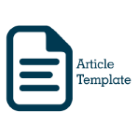INFORMATION AND COMMUNICATION TECHNOLOGIES IN TECHNICAL (ICTS) AND VOCATIONAL EDUCATION AND TRAINING (TVET) FOR INTEGRATION TOWARD KNOWLEDGE MANAGEMENT
Abstract
The relevance of Information and Communication Technology (ICT) in the field of Technical Vocational Education and Training (TVET) cannot be overemphasized in community studies. The era of work is changing constantly like ICT, thus creating more challenges for workers in the face of the current globalization in the 21st century and the University responsible for its provision. Although many studies explain and demonstrate the extent to which ICT is applied to different educational disciplines, the literature on effective ICT integration in the field of Technical Education and Training (TVET) is limited and requires further exploration to highlight the level of TVET requirements for ICT integration. Therefore, this paper attempts to add to the ICT integration in TVET by making it clear; the need for effective ICT integration in TVET, the factors that influence effective ICT integration in TVET, the overview of the challenges for effective ICT integration in TVET. This paper proposes for the planning and management of ICT resources on TVET.
Keywords
Full Text:
PDFReferences
Blignaut AS, Hinostroza JE, Els CJ, Bruns M (2010). ICT and education policy and practice in developing countries: South Africa and Chile compared through SITES 2006. Comput. Educ., 55: 1552-1563.
British Educational Communications and Technology Agency (2004). A review of research literatures on barriers to the uptake of ICT by teachers. Retrieved 1st March, 2011 from http://www.becta.org.uk.
Brummelhuis ACA (1995). Models of educational change: in Drent, M.,
& Meelissen, M. (2008). Which factors obstruct or stimulate teacher educators to use ICT innovately? Comput. Educ., Elsevier Ltd, 51: 187-199.2015
Bryderup IM, Larson A, Quisgaard TM (2009). ICT-use, educational policy changes in pedagogical paradigm in compulsory education in Denmark: from a lifelong learning paradigm to a traditional paradigm? Educational Information Technology. Springer Science + Business Media, LLC, pp. 365-379.
Collins A, Halverson R (2009). Rethinking education in the age of technology: the digital revolution and schooling in America. Teachers college press, Teachers college, Columbia, Columbia University.
Drent M, Meelissen M (2008). Which factors obstruct or stimulate teacher educators to use ICT innovatively? Comput. Educ., 51: 187-199.
Gulbahar Y (2007). Technology planning: A road map to successful technology integration in schools. Comput. Educ., Elsevier Ltd, 49: 943-956
Hollander A, Mar NY (2009). Towards achieving TVET for All. In R. Maclean, & D. Wilson, (eds). International handbook of education for the changing world of work: Springer Science + Business Media BV, pp. 1863-1877.
Howie SJ, Blignaut AS (2009). South African readiness to integrate ICT into mathematics and science pedagogy in secondary schools. J. Educ. Inform. Technol. Himgham, MA, USA, 14(4).
Jantrakool R (2010). Integration of information and communication technology (ICT) into vocational education in Thailand. Proceedings of the international conference on VTET research and networking, 23-24 June.
Jimoyannis A (2010). Developing a Technological Pedagogical Content Knowledge Framework for Science Education: Implications of a Teacher Trainers’ Preparation Program. Proceedings of Informing Science & IT Education Conference (InSITE.). Retrieved on 2/03/2011 from http://proceedings.informingscience.org
Kim MH, Park M-G (2009). A short method for building web-based teaching and learning systems: the CPSC experience. In R. Maclean,
& D. Wilson, (eds). International handbook of education for the changing world of work Springer Science + Business Media BV., pp. 1863-1877.
Kotsik B (2009). ICT application in TVET. In R. Maclean, & D. Wilson, (eds). International handbook of education for the changing world of work: Springer Science + Business Media BV., pp. 1863-1877.
Lawrence JE (2007). Technical and Vocational Education and Training:
Issues, Concerns and Prospects. Learn. Sustain. Dev., 8(1): 329-342.
Leach J (2005). Do new information and communication technologies have a role to play in achieving quality professional development for teachers in the globe south? Curriculum J., 16(3): 293-329.
Louw J, Brown C, Muller J, Soudien C (2009). Instructional technologies in social science in South Africa. Comput. Educ., 53: 234-242. Elsevier Ltd.
Muniandy V, Lateh H (2010). ICT implementation among Malaysian schools: GIS, obstacles and opportunities. Procedia Social. Behav. Sci., Elsevier Ltd, 2: 2846- 2850.
Organisation for Economic Co-operation and Development (2004). A new economy? The changing role of innovation and information technology in growth. Paris: OECD.
Y. A. Wahab and A.S.H. Basari. (2013). “Analysis of down time and reliability estimation in hostel building maintenance-a case study,”Middle-East Journal of Scientific Research, Vol. 17, no. 9, pp.1260-1268.
Y. A. Wahab and A.S..H Basari. (2014). ?Replacement Model for Higher Education Institution Hostel Building Maintenance in Malaysia? International Journal of Trade, Economics and Finance, IJTEF 2014 Vol.5(5): 449-453 ISSN: 2010-023X.
Y. A. Wahab and A.S..H Basari. (2014). „Identifying the best parameter distribution for university hostel building maintenance? Middle-East Journal of Scientific Research 22 (8): 1145-1149, 2014.ISSN 1990-9233 © IDOSI Publications.
Y. A. Wahab and A.S..H Basari. (2014). „Replacement model for hostel building case study: ICYM? Middle-East Journal of Scientific Research 21 (11): 1977-1981, 2014 ISSN 1990-9233 © IDOSI Publications.
Y. A. Wahab and A.S..H Basari. (2015), „Best parameter of the hostel building component maintenance? International Journal of Computer Applications (0975 – 8887) Vol. 110 – No. 15, January 2015
Wang T (2015). Rethinking teaching with information and communication technologies (ICTs) in architectural education. Teach. Teacher. Educ., 25: (1132-1140)
Zarini et-al (2015). Overview: The growing role of ICTs in education and training. In R. Maclean, & D. Wilson, (eds). International handbook of education for the changing world of work Springer Science + Business Media BV., pp. 1863-1877.
Refbacks
- There are currently no refbacks.
This is an Open Access article distributed under the terms of the Creative Commons Attribution-NonCommercial-NoDerivatives 4.0 International (CC BY-NC-ND 4.0), permitting copy and redistribute the material in any medium or format.




